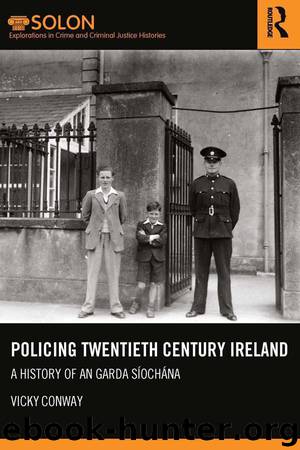Policing twentieth century Ireland (Routledge SOLON Explorations in Crime and Criminal Justice Histories) by Conway Vicky

Author:Conway, Vicky [Conway, Vicky]
Language: eng
Format: mobi
ISBN: 9781135089542
Publisher: Taylor and Francis
Published: 2014-02-17T00:00:00+00:00
Conclusion
Chapter 4 outlined how policing in the 1960s in Ireland involved little crime and much administrative work. Garda concerns centred on pay and conditions and morale was low as a result. Set against that, the impact of the Troubles was stark. The Troubles exposed how unprepared the force was to deal with anything beyond the peaceful policing experiences of the preceding years. It changed the nature of policing in Ireland, the functions members were expected to perform and the incidents encountered on a daily basis.
An Garda Síochána had not been forced to deal with the subversive tactics of groups like the IRA since the early 1940s. Only those within Special Branch had any relevant training but as the death of men painfully showed, policing the Troubles was not a task performed solely by Special Branch detectives. The force was consumed in this work but did not have the equipment or the skills to deal with the crimes being committed in the country. This was most pointedly witnessed by the killing of a trainee garda in the search for the kidnappers of Don Tidey and in the fact that despite riots in the 1970s none of the gardaí present at the protests for the hunger strikers in July 1981 had received riot training.
The daily routine of their jobs and the functions they had to perform altered substantially. While one garda spoke of dealing with little more than thefts of bicycles in his first few years in the force, gardaí were now dealing with dramatic rises in crime, with a particularly large increase in the number of armed robberies occurring, being sent to the border or to prisons, and responding to incidents where individuals had been killed. Nor was there any geographical pattern to these events, so members in any part of the country could at any point become involved in these incidents. Interviewees told how this work could be boring, exciting, scary or traumatic, and at all times they were expected to deal with whatever happened. As I5 stated, ‘the career varied from basically mundane void of nothing happening to explosions, guns off fellows, violence in the H-Block demonstration to tranquil living in Headquarters’.
For all those interviewed the most difficult part of their job was when fellow gardaí were killed in the line of duty. That which had been a peaceful, safe, respected job, no longer was. The reality was that they could be killed in the course of their work, even if not in Special Branch. Not only did they have to deal with this danger, but also with the fact that there were people who were willing to kill them. Their authority and legitimacy was being challenged in a way that this generation had never experienced previously. The effect of this on these men was clear in the interviewees' responses.
Policing along the border was both political and dangerous. The lived experience of the border during the 1970s and 1980s bears a greater resemblance to the accounts documented by Brewer et al.
Download
This site does not store any files on its server. We only index and link to content provided by other sites. Please contact the content providers to delete copyright contents if any and email us, we'll remove relevant links or contents immediately.
| Africa | Americas |
| Arctic & Antarctica | Asia |
| Australia & Oceania | Europe |
| Middle East | Russia |
| United States | World |
| Ancient Civilizations | Military |
| Historical Study & Educational Resources |
Room 212 by Kate Stewart(5105)
The Crown by Robert Lacey(4807)
Endurance: Shackleton's Incredible Voyage by Alfred Lansing(4769)
The Iron Duke by The Iron Duke(4350)
The Rape of Nanking by Iris Chang(4203)
Joan of Arc by Mary Gordon(4103)
Killing England by Bill O'Reilly(3997)
Say Nothing by Patrick Radden Keefe(3975)
I'll Give You the Sun by Jandy Nelson(3429)
Shadow of Night by Deborah Harkness(3361)
Hitler's Monsters by Eric Kurlander(3329)
Mary, Queen of Scots, and the Murder of Lord Darnley by Alison Weir(3208)
Blood and Sand by Alex Von Tunzelmann(3195)
Eleanor & Park by Rainbow Rowell(3153)
Darkest Hour by Anthony McCarten(3119)
Margaret Thatcher: The Autobiography by Thatcher Margaret(3080)
Book of Life by Deborah Harkness(2933)
Red Famine: Stalin's War on Ukraine by Anne Applebaum(2929)
The One Memory of Flora Banks by Emily Barr(2857)
